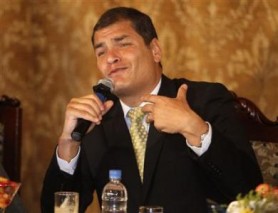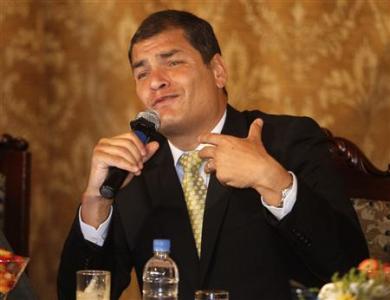QUITO (Reuters) – Ecuador’s President Rafael Correa said yesterday he had no immediate plans to try to break his deadlock with Congress by dissolving the legislature, but had not ruled out the option after police protests last week.
Dissolving Congress would allow the fiery Correa to rule by decree until new elections. He had been considering the move since before the South American oil producing country was rocked last Thursday by violent police protests.
“We do not see any immediate need (to dissolve Congress), but we cannot exclude it either,” Correa told a news conference. “Today, more than ever, the possibility is distant, but we do not exclude it in the future.”
Renegade police burned tires in the streets to protest a new law curtailing bonuses and perks for public employees.
Correa went to police headquarters to address the protesters and was teargassed and roughed up by the officers.
The president sought refuge in a nearby hospital, where angry protesters surrounded him.

He was held there until late on Thursday night when army commandos stormed the hospital and rescued him in a hail of gunfire.
The Andean country is in an official state of alert until Friday. The government replaced the police who usually provide security at Congress with army troops. Correa called Thursday’s unrest a coup attempt orchestrated by his foes.
The president has majority support in the 124-member Congress. But his agenda there has been slowed by disagreements in his coalition over bills including proposals to reform state finances and the higher education system.
Correa’s popularity rose 5 percentage points to 58 per cent after last week’s violence, according to a survey released on Tuesday by Cedatos-Gallup. But only half of those polled agreed with the government that the protests amounted to an attempted coup.
The president, a US-trained economist, was first elected in 2006 promising a “citizens revolution” aimed at increasing state control of Ecuador’s natural resources and fighting the country’s traditional political parties.
Once in power he backed the rewriting of the constitution to tilt the balance of power toward the executive. He easily won re-election under the new constitution in 2009 and is allowed under the law to run again for the presidency in 2013.

